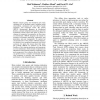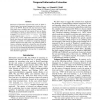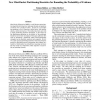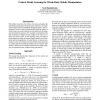77
Voted
AAAI
2010
15 years 2 months ago
2010
Intentions have been widely studied in AI, both in the context of decision-making within individual agents and in multiagent systems. Work on intentions in multi-agent systems has...
82
Voted
AAAI
2010
15 years 2 months ago
2010
The behavior of a complex system often depends on parameters whose values are unknown in advance. To operate effectively, an autonomous agent must actively gather information on t...
108
Voted
AAAI
2010
15 years 2 months ago
2010
Computer agents are increasingly deployed in settings in which they make decisions with people, such as electronic commerce, collaborative interfaces, and cognitive assistants. Ho...
102
Voted
AAAI
2010
15 years 2 months ago
2010
Recent advancements in model-based reinforcement learning have shown that the dynamics of many structured domains (e.g. DBNs) can be learned with tractable sample complexity, desp...
AAAI
2010
15 years 2 months ago
2010
Modern complex games and simulations pose many challenges for an intelligent agent, including partial observability, continuous time and effects, hostile opponents, and exogenous ...
AAAI
2010
15 years 2 months ago
2010
Research on information extraction (IE) seeks to distill relational tuples from natural language text, such as the contents of the WWW. Most IE work has focussed on identifying st...
107
click to vote
AAAI
2010
15 years 2 months ago
2010
Multi-Agent Plan Recognition (MAPR) seeks to identify the dynamic team structures and team behaviors from the observations of the activity-sequences of a set of intelligent agents...
130
click to vote
AAAI
2010
15 years 2 months ago
2010
Mini-Bucket Elimination (MBE) is a well-known approximation algorithm deriving lower and upper bounds on quantities of interest over graphical models. It relies on a procedure tha...
85
Voted
AAAI
2010
15 years 2 months ago
2010
108
Voted
AAAI
2010
15 years 2 months ago
2010
Ontology matching is the problem of determining correspondences between concepts, properties, and individuals of different heterogeneous ontologies. With this paper we present a n...




